- Home
- Suzanne Selfors
Smells Like Treasure Page 7
Smells Like Treasure Read online
Page 7
Homer checked his Quality Solar-Powered Subatomic Watch. Fortunately the battery was fully charged, so the clock’s dials spun in a complex dance—eight o’clock in the morning in Shanghai, noon in Auckland, and eight o’clock at night in Gloomy Moor. Another hour to go before sunset.
As the train’s chugging faded, the steam cleared. The depot was nothing more than a long concrete slab and a wooden bench. A sign nailed to a post read:
Welcome to Gloomy Moor. Population: One.
A train schedule hung on another post:
Northbound from Gloomy Moor: 9 a.m.
Southbound from Gloomy Moor: 8 p.m.
The train had arrived on time, but Zelda wasn’t waiting. She’d said she’d meet him at the station, and since she’d been the one who’d purchased the tickets, she knew when to expect him. Why wasn’t she there?
Homer pulled out his Borington Binoculars, and he and Dog turned in a full circle. The moor was flat as far as the eye could see. Not a hill, not a mound, not even a lump in the perfect plane of stubby marsh grass. Homer buttoned his coat all the way to his chin as mist settled on his face. A bullfrog croaked. Dog barked. Another bullfrog croaked. Dog barked again. Then a million bullfrogs joined in, their chorus filling the air.
“Zelda!” Homer hollered, cupping his hands around his mouth. “Zelda!”
Time passed. The frogs continued their monotonous melody. Homer looked at his watch again. The spring sun began to melt on the horizon, casting pink light across the glistening landscape. But no lantern appeared in any direction. “Zelda!”
Dog wandered to the edge of the slab where a muddy trail began. Being the only trail, it probably led to Zelda’s house. But what if the trail forked? Zelda hadn’t provided Homer with a map, so how would he know which way to go?
“I think we should stay put,” Homer hollered so Dog could hear him over the boisterous frogs. “She’ll come. She’s just running late.”
But Dog didn’t stay put. He jumped onto the trail and sniffed the ground. His movement must have disturbed the frogs because they stopped croaking. Dog walked in a tight circle, then sniffed some more. Homer took a sharp breath. There was only one reason in the world for Dog to sniff, because there was only one thing Dog could smell.
“What is it, boy?” Homer asked. “What did you find? Did you find some treasure?”
Dog flipped onto his back and started rolling on the trail, covering himself with the precious scent. Homer crouched at the edge of the concrete slab. “Good boy,” he said. There was no way of knowing what Dog would dig up. The only thing Homer knew was that it would be something that someone desperately wanted—for that was the truest definition of treasure.
With a grunt, Dog struggled to his paws. He started digging. “Ur, ur, ur, ur,” he said. Dirt flew. Dog dug. Homer watched from his squatting position, his legs growing numb, but he didn’t move.
“Good boy,” he repeated, his eyes wide with anticipation.
Then the digging stopped. Dog pressed his face into the hole. After a flick of his head, something flew through the air and landed at Homer’s feet. In the fading light, it appeared to be a nut. Not the shelled kind of nut, but the hardware store kind of nut—silver and shaped like a hexagon. Didn’t look like much, but Homer knew it couldn’t be an ordinary nut. It belonged to something special.
He patted Dog’s head, then stuck the nut into his jean pocket. Then with his foot, he pushed the dirt back into the hole and patted it down. Still no sign of Zelda—or anyone for that matter. “Come on,” he said to Dog.
Once he’d settled on the bench with Dog at his feet, the frogs resumed their serenade. How long will we have to wait? Homer wondered. His family was probably eating dessert around the kitchen table. The second day of the Milkydale County Fair had come and gone. Who had won the dog trials? Had Squeak gotten the chance to go on the Whirl-a-Tron? Had Mayor Sneed figured out how much it was going to cost to rebuild the gunnysack slide?
Was everyone still mad at him?
He would find out when he returned home. For now, he’d come to Gloomy Moor to meet a group of professional treasure hunters and claim membership in a secret society. That was his focus. One worry at a time, as Zelda had said.
The frogs stopped croaking again. After such a ruckus, the silence was almost deafening. Dog’s head shot up. Moving only his eyeballs, Homer looked around. Did the frogs know something? There’s some nasty wildlife out on the moor. A coyote? A wolverine? What?
Homer nearly fell off the bench when something landed on the top of his head. He swatted at it. A frog leaped off his head and landed on Dog’s head. Dog groaned and shook his head, sending the frog flying across the slab. Another frog landed on Homer’s leg. Another on his hand. “Hey,” Homer said, flicking them away. Dog stood and shook a frog from his back. Then Homer gasped. It was as if someone had flipped on a switch, because the air vibrated as little green critters leaped from the grass. They gathered on the slab, dozens and dozens, then hundreds. They flew past Homer’s face, over his head, and under the bench. A growl rose in Dog’s throat as a frog landed on the tip of his nose. “Yuck!” Homer cried, one landing on his chin. Dog turned in frantic circles but couldn’t build up enough centrifugal force to dislodge the critters. Homer’s eyes widened.
The concrete slab had transformed into a pulsating carpet of green.
Homer pulled Dog closer as countless pairs of bulbous eyes stared up at him.
A terrible image filled Homer’s mind. His uncle Drake had been eaten by a mutant carnivorous tortoise. Most people would say that being eaten by a tortoise is impossible. But it had happened. There’d been witnesses. Was it possible to be eaten by an army of frogs?
The sun melted into nothingness, and the frogs disappeared in a cloak of total darkness. One croaked, followed by another, and once again the chorus belted out its song. Dog nudged Homer with his nose.
“I agree. Let’s get out of here,” Homer said, wiping a frog off his ear. He tore open his backpack and felt around for his night vision headlamp. The elastic strap fit snugly across his forehead. When he switched the lamp on, thousands of tiny white eyes, like spilled popcorn, popped out from the darkness. A shudder ran between Homer’s shoulders. He threw on his backpack, grabbed the leash, then slid his feet across the slab, pushing his way through the amphibians. They clung to his pant legs and shoes. But as soon as he stepped onto the muddy trail, the frogs abandoned him, leaping back onto the slab. After flicking one last frog from his shoulder, Homer hurried away, with Dog at his heels.
“This has to lead somewhere,” he told Dog, as much to settle his friend’s nerves as his own.
“Urrrr.”
It certainly felt better to be on the move. Dog waddled behind Homer, his long ears swaying, his big paws plodding through the mud. “We’ll probably run into Zelda along the way,” Homer said hopefully. She knew he was coming. But maybe she was a forgetful kind of person, someone who got distracted by a good book or a new map.
The trail continued in a straight line. A breeze blew across the grasses, coating the travelers with mist. Dog sneezed as mist crept up his nose. Not a star appeared in the cloudy sky. Except for the beam of Homer’s headlamp, blackness enveloped the moor. Homer tried to remember when he’d last replaced the headlamp’s battery. This would be a really bad time for it to die.
Dog began to wheeze, which he did when he walked too fast. But Homer wasn’t about to slow down. The air temperature was steadily dropping and his thin plaid raincoat wouldn’t keep him warm if they ended up getting stuck out there all night. “Sorry, Dog,” he said. “I know you’re tired, but we’ve got to keep going.”
Survival skills are an important part of a treasure hunter’s education. A single night, stuck in the elements, can bring down the toughest of treasure hunters. Take Ridley Whip, for example, famous for discovering the Lost Mines of the Antipodes. He skipped survival training, which is why he thought nothing bad could happen from spending a balmy night, without a sle
eping bag or tent, under a starry sky. He went to sleep and never awoke, for during the night the temperature plummeted and hypothermia set in, slowly freezing every cell in his body. Homer had read about it in chapter 7 of Twentieth Century Treasure-Hunting Disasters.
Homer had never taken any survival classes. Uncle Drake had died before teaching him how to build a fire with wet grass, or how to make a tent from a plaid raincoat, or how to make a delicious stew of green frogs.
We won’t get stuck out here, he told himself.
As the distance to the train depot widened, the frog chorus faded. Other than Homer’s and Dog’s labored breathing and an occasional fluttering sound in the grasses, the moor was eerily quiet. “Just birds,” Homer said, though he didn’t really know. He was trying not to imagine the nasty wildlife he’d been warned about. When footsteps sounded in the distance, his first reaction was relief.
“Zelda?” he called. The footsteps stopped. Homer aimed the headlamp’s beam approximately eight feet off the ground. “Zelda? Is that you?” No one answered and no one appeared in the beam. He started walking again. After a few minutes the footsteps resumed. Two feet, not four, he was pretty sure by the rhythm. But this time he realized that the footsteps came from behind. He and Dog spun around.
“Grrrr,” Dog said.
“Zelda?” The headlamp’s beam revealed nothing. “Who’s there?”
No one answered.
The back of Homer’s neck prickled. If someone had been out for a peaceful walk on the moor, that someone would have brought a lantern and would have called out “Hello.” But this person was hiding. Or worse—following.
Homer wasn’t exactly sure why someone would be following him, but clearly this person was up to no good. If robbery was the goal, Homer wasn’t about to make it easy. No way was he going to hand over his drafting supplies, or his solar-powered watch or any of the items he’d carefully packed in his backpack.
More footsteps.
Dog needed no convincing. They took off down the trail at full speed. Homer’s knees ached. The backpack rubbed against his shoulders as he desperately ran. The headlamp’s beam bobbed like a drunk firefly.
It’s difficult to judge distance in the dark, but Homer and Dog ran as far as they could before they stopped to catch their breaths. Homer staggered, gasping for air. Dog’s tongue hung out of his mouth. Homer held his breath and listened. He put his hand over Dog’s panting mouth and strained his ears. For a moment, all was quiet. Maybe the person had given up. But Homer wasn’t taking any chances. They needed to get to Zelda’s.
“Come on,” he whispered, tugging on the leash. “Dog, come on.” But Dog wouldn’t budge. He collapsed onto the trail, transforming his body into an unmovable boulder. Homer pushed Dog’s rump. “This is not the time to be stubborn.” He pushed again. Dog, with a moan of complaint, rose onto his paws.
The terrain changed from short, mist-covered grasses to taller grasses and windswept trees that all leaned in the same direction, as if eavesdropping on someone. Homer and Dog stopped now and then to listen, but no footsteps followed. Homer swallowed, but it didn’t soothe his dry throat. His shoulders burned from the backpack straps.
“Hey, do you smell that?” he asked, sniffing the air. Of course Dog couldn’t smell it, and of course Homer knew that, but Homer just wanted to hear the sound of a familiar voice, even if it was his own. “It’s burning wood. Someone’s made a fire.” Which was a very good sign, indeed.
There, in the distance, a light twinkled.
Homer smiled. “Come on.”
The trail grew steeper and the breeze saltier, blowing Homer’s hair into his eyes. He held tight to Dog’s leash as gravity pulled them down the sandy trail. Dog’s ears flapped as he waddled, his legs splayed like a bowlegged cowboy. Waves crashed in the distance. “We’re near the ocean,” Homer said.
The smoky scent grew stronger. Homer’s headlamp lit up a sign that hung from a gnarled arbor built of driftwood. The sign rocked in the wind. ZELDA’S TRINKET SHOP. Relief washed over Homer. “We’re here.”
A dirt road, which came from the opposite direction of the train station, led up to the arbor and widened into a small parking lot. The cloudcopter sat at the edge of the lot. The trinket shop, which stood a few yards past the arbor, was dark. But beyond the shop, an oil lamp lit up the front window of a cottage. Smoke rose from a chimney pipe. Homer threw himself at the cottage’s enormous front door, pounding with his last surge of strength. The door flew open.
Zelda winced, shielding her eyes from the headlamp. Homer turned it off. “Homer!” she cried. “Are you here already? Where has the time gone? I was supposed to meet you at the station. I’m so sorry. Something came up. Something very important.”
Dog waddled into the cottage and collapsed on the floor.
“Someone’s following us,” Homer said. “I heard footsteps. So did Dog.”
Zelda reached out her long arm and pulled Homer inside. “Stay here,” she told him. She grabbed her cloak and wrapped it around her shoulders. Then she took a lantern from a shelf and lit it. “Bolt the door,” she ordered. “Don’t let anyone in unless it’s me.” Then she hurried off into the night.
“But Zelda…” Homer stood in the doorway, watching as her lantern disappeared beyond the arbor.
Did she know who was following him? It had to be someone dangerous, otherwise why would she want him to bolt the door? What if she needed help? He was about to step back outside when a loud crash rattled the door.
The crash came from inside the cottage.
13
Hercules Simple
Dog cocked his head and looked down Zelda’s hallway, a soft growl vibrating in the depths of his wrinkly neck. Homer grabbed a black umbrella from a brass umbrella stand. The tip, plastic and blunt, was not much of a weapon, but it would have to do. Whoever had followed them along the moor might have come in through a back door.
His heart pounding, his skin clammy, he held the umbrella like a sword. If only he knew how to use a sword. According to The Biography of Rumpold Smeller, Rumpold had been trained in the art of sword fighting. Homer’s uncle Drake had a black belt in karate. The Milkydale Community Center, however, had never offered classes in swordplay or self-defense techniques. Regrets filled Homer’s mind. Why hadn’t he paid more attention during those ninja movies? Why hadn’t he practiced on that punching bag that his dad kept in the back of the barn or asked his uncle Drake to teach him some moves? The only person Homer ever fought was his sister, Gwendolyn, and that was always a matter of self-defense.
Homer tiptoed down the hall. Dog whined but didn’t budge from his place by the front door. One step closer, two steps. Homer’s hand trembled. Stop it, he told himself. Be brave. Be brave like Uncle Drake.
Light glowed at the hall’s end. Homer’s raincoat crinkled with each step. When he reached the end of the hallway, he took a quick breath, then darted around the corner, stabbing the air with his umbrella. “Who are you?” he cried.
“I’m Hercules,” a quiet voice replied. “Hercules Simple.”
Hercules sat in the middle of an enormous leather chair. At first Homer thought Hercules was a little kid because his feet didn’t reach the floor. But then Homer realized that all the faded and patched furniture had been built to fit Zelda. The entire room was Zelda-size, from the tall ceilings to the massive fireplace that cast a gentle, flickering glow.
“You shouldn’t point an umbrella like that,” Hercules said, his face hidden in the chair’s shadow. “You could gouge out someone’s eye, or pierce someone’s liver.”
“I heard a crash,” Homer said, tightening his grip on the plastic handle.
“I accidentally knocked over my first-aid kit.” Hercules pointed to a coffee table—a huge slab of marble that sat atop of giant piece of driftwood. On top was a metal box with a handle. As Hercules scooted to the edge of the leather chair, the fire’s glow illuminated his face.
Homer guessed, from the splotch of pimples on H
ercules’s forehead, that he was around Gwendolyn’s age. His wiry black hair was cut short, and his nose was wide and flat. His skinny legs poked out from his green flannel bathrobe like two twigs. Homer’s fear faded, and he slowly lowered the umbrella. An intruder wouldn’t be sitting in bare feet, in a bathrobe, with a plate of cookies on his lap.
Hercules sneezed. “Excuse me,” he said. Then he sneezed again. “There’s so much pollen out here on the moor. I’m afraid I might be developing allergies.” He felt the glands at the sides of his neck. “I wouldn’t want to develop an allergy, because that could create a blockage of my Eustachian tubes, resulting in partial or total hearing loss. How does my throat look? Is it red?” He threw back his head and opened his mouth real wide.
“I don’t know,” Homer said, keeping his distance. What was a Eustachian tube anyway? His sister, Gwendolyn, would know. She’d probably come across many Eustachian tubes while practicing her taxidermy skills.
Hercules motioned Homer closer, then opened his mouth wider. From where he stood, Homer couldn’t see anything but Hercules’s teeth. He took a few steps closer and leaned across the coffee table. “I guess it looks kinda red.”
Hercules’s mouth snapped shut. “Red? What shade of red? Fire engine? Cherry? Did you see any white dots?”
“I don’t know,” Homer said with a shrug. He set his backpack down, then pulled off his headlamp and tucked it into one of the pockets.
“Howoooo!”
Hercules sat up straight. “Is that a dog?” he asked, wide-eyed.
“Yeah. It’s my dog.”
“Is it a big dog? Is it aggressive?” His lower lip quivered a bit. “I don’t like dogs.”
“He’s a nice dog. Come on, Dog,” Homer called.
Clicking nails sounded as Dog hurried down the hall, his leash dragging behind. He waddled into the sitting room and pushed between Homer’s shins. Homer gave Dog’s rump a good scratch, then removed the leash. “Sorry I left you,” he said.
Dog walked over to the leather chair and touched his nose to Hercules’s foot. Hercules pulled up his legs and curled into the corner of the chair, trying to get as far away from Dog as possible. As he did so, the plate of cookies tumbled off his lap. “I don’t like dogs,” he repeated.

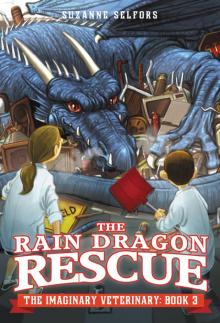 The Rain Dragon Rescue
The Rain Dragon Rescue Ginger Breadhouse and the Candy Fish Wish
Ginger Breadhouse and the Candy Fish Wish Ever After High: Lizzie Hearts and the Hedgehog’s Hexcellent Adventure: A Little Shuffle Story
Ever After High: Lizzie Hearts and the Hedgehog’s Hexcellent Adventure: A Little Shuffle Story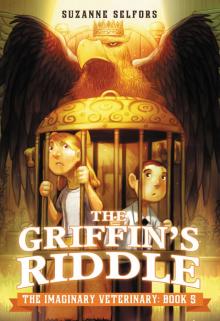 The Griffin's Riddle
The Griffin's Riddle Smells Like Pirates
Smells Like Pirates Duchess Swan and the Next Top Bird
Duchess Swan and the Next Top Bird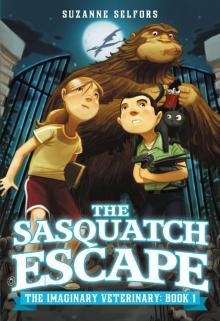 The Sasquatch Escape
The Sasquatch Escape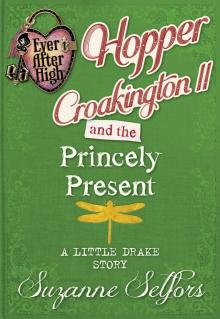 Hopper Croakington II and the Princely Present
Hopper Croakington II and the Princely Present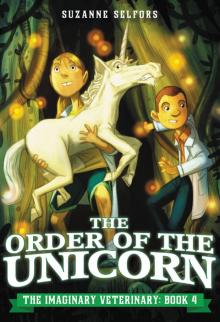 The Order of the Unicorn
The Order of the Unicorn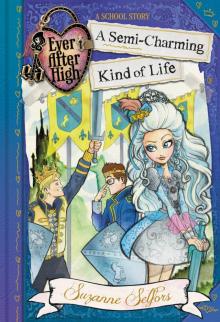 A Semi-Charming Kind of Life
A Semi-Charming Kind of Life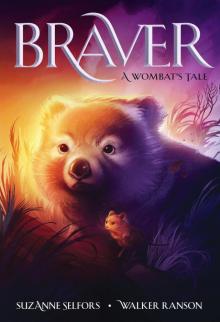 Braver
Braver Kiss and Spell
Kiss and Spell Wedgie & Gizmo
Wedgie & Gizmo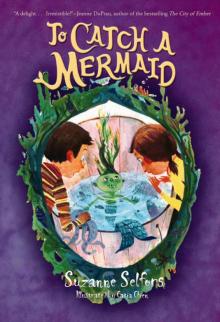 To Catch a Mermaid
To Catch a Mermaid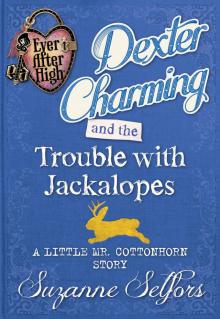 Dexter Charming and the Trouble with Jackalopes
Dexter Charming and the Trouble with Jackalopes The Sweetest Spell
The Sweetest Spell CoffeeHouse Angel
CoffeeHouse Angel Wish Upon a Sleepover
Wish Upon a Sleepover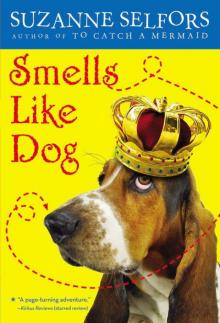 Smells Like Dog
Smells Like Dog Ever After High
Ever After High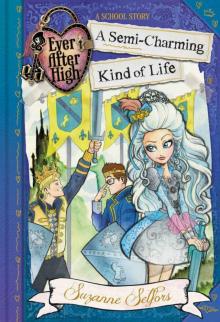 Ever After High: A Semi-Charming Kind of Life
Ever After High: A Semi-Charming Kind of Life Saving Juliet
Saving Juliet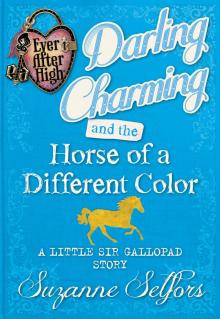 Darling Charming and the Horse of a Different Color
Darling Charming and the Horse of a Different Color Wedgie & Gizmo vs. the Toof
Wedgie & Gizmo vs. the Toof Spirit Riding Free--The Adventure Begins
Spirit Riding Free--The Adventure Begins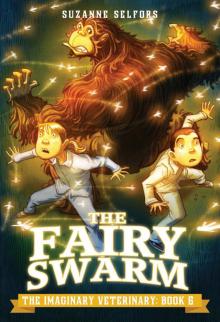 The Fairy Swarm
The Fairy Swarm Ever After High: Next Top Villain: A School Story
Ever After High: Next Top Villain: A School Story Fortune's Magic Farm
Fortune's Magic Farm The Lonely Lake Monster
The Lonely Lake Monster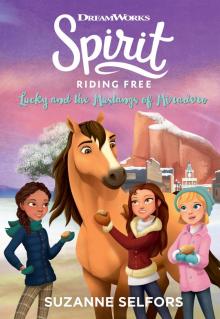 Spirit Riding Free--Lucky and the Mustangs of Miradero
Spirit Riding Free--Lucky and the Mustangs of Miradero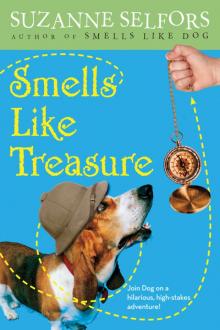 Smells Like Treasure
Smells Like Treasure Mad Love
Mad Love